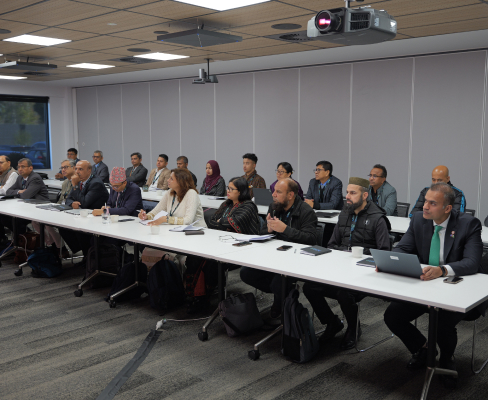

This training program focused on essential aspects of Road Asset Management (R.A.M.), including Multi-modal transportation, Intelligent Transport Systems, economic rationale, and cross-cutting functions. Designed for senior executives from both public and private sectors in South Asia, it integrated Road Asset Management into the region’s developmental strategy. Through a blended learning approach, combining online modules with classroom sessions, site visits, and interactions with experts and relevant organizations, participants learned from global experiences and build valuable networks.
This short course training, tailored for participants selected for the SARIC cohort, aimed to:
- Enhance participants’ knowledge and skills in R.A.M., addressing emerging challenges and techniques within transportation infrastructure management
- Develop a curriculum to garner senior executive support from SARIC priority countries, spanning government and private sectors
- Expand participants’ network and exposure to Australian industry and government
- Foster cross-border collaboration among regional participants to absorb and apply best practices.
- Influence the attitudes and behaviours of personnel engaged in large-scale infrastructure projects through SARIC training and networking
- Optimize Australian expertise to support the development of individuals and institutions involved in regional connectivity
- Advocate for the adoption of GEDSI best practices in transport and energy project design and operations
The blended learning approach included three components:

Setting the learning context and expectations is an important part of the SARIC trainings. The training partner ensured that SARIC trainees are aware of the learning outcomes, training assessment rules, training topics, guidelines of stay in Australia and preconditions if any.
During this phase, the SARIC trainees were also made familiar with the faculty members and fellow trainees. This phase introduced the SARIC trainees to Australian culture, expected behaviour on campus and outside campus in Australia, reasonable accommodation and access facilities for persons with disability and other relevant information necessary for a comfortable training and stay in Australia.
This phase extended over 1-2 days and was be conducted virtually through live classes typically 2 weeks before departure from their home countries.

This component involved a 7-10 day study program and experiential activities delivered in Australia. Apart from the in-class training, this component included field visits that allowed the trainees to get practical exposure to the concepts taught. These field visits were planned by the training partner in line with the course content.
The training partner organised a networking event on one of the days, in collaboration with Palladium, to expand the networking opportunities for the trainees along with providing a knowledge exchange platform. This event allowed engagement with suitably senior officials and officers from the utilities, R.A.M. consultants and the private sector.

The training partner engaged with the SARIC trainees after one month of their return from training in Australia. This was a one-day online engagement where the trainees will present progress on their ‘SARIC in Workplace (SiW)’ plan and seek feedback.
This phase helped to relate the concepts learned to the workplace, thus reinforcing the training undertaken.
Through a combination of online and offline learning activities, including site visits, case studies, and interactions with Australian experts and institutions, participants gained:
- Increased awareness of cutting-edge approaches, principles, and data-driven technologies in R.A.M., including intelligent transportation systems
- Deeper understanding of quality control imperatives within the broader context of road sector management, considering both country-specific nuances and the evolving roles of public and private stakeholders
- Enhanced competencies in evaluating options and trade-offs in traffic system management and R.A.M
- Insights into the multidisciplinary nature of R.A.M., spanning engineering standards, business practices, socio-economic objectives, climate change resilience, governance, and policy considerations within larger developmental frameworks
- Ability to apply acquired knowledge effectively in workplace settings post-training